Kim Potter Found Guilty for Death of Daunte Wright
- Kim Potter was charged with both 1st- & 2nd-degree manslaughter for the death of Daunte Wright
- Potter was found guilty on both counts
- The former Brooklyn Center police officer was sentenced to 2 year in prison
- Potter fatally shot Daunte Wright during a traffic stop on April 11th, 2021
Kim Potter Sentenced to 2 Years in Daunte Wright’s Death
Former Brooklyn Center police officer Kim Potter received a two-year sentence Friday for the April 11 traffic stop death of Daunte Wright. It was a downward departure from state sentencing guidelines. Potter was convicted in December of both first-degree and second-degree manslaughter. She was sentenced Friday for only the most serious charge of first-degree manslaughter.
“I pray for you and Daunte many, many times a day,” Potter told the court speaking directly to Daunte Wright’s family. “He is not more than one thought away from my heart and I have no right for him to be in my heart.”
Hennepin County Judge Regina Chu, who issued the sentence, called it “one of the saddest cases I’ve had on my 20 years on the bench.”
Under Chu’s sentence:
Potter will spend 16 months in prison and the rest on supervisory release. She will be credited for 58 days served for her time served at the state’s women’s prison in Shakopee. Potter was also fined $1,000 and ordered not to possess any firearms in the future. Chu noted that Potter does have the right to appeal her sentence.
“I recognize there will be those who disagree with the sentence. That I granted a significant downward departure does not in any way diminish Daunte Wright’s life,” said Chu. “His life mattered.”
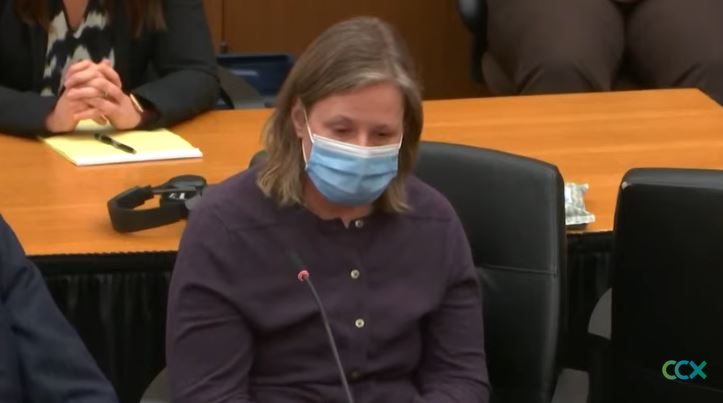
Former officer Kim Potter during Friday’s sentencing hearing
‘I will never be able to forgive you’
Daunte Wright’s family provided impact statements during Friday’s sentencing hearing. Katie Wright, Daunte’s mother, said she had many sleepless nights thinking about what to say. Her son was 20 years old when he was killed.
“Your honor, I hope the defendant is listening as I speak loud and clear today. And yes, I refer to her as defendant. Because I will not give her the respect of calling her by her name. She referred to Daunte over and over again as the driver, as if killing him wasn’t enough to dehumanize him. She never once said his name. And for that I will never be able to forgive you,” said Katie Wright.
Arbuey Wright, Daunte’s father, also spoke.
“Daunte meant the world to me. He was my son,” said Arbuey Wright. He mentioned that his son was named after Daunte Culpepper, the former Vikings quarterback. Daunte was the couple’s first child together.
“Nothing will ever be the same. Everything we do as a family ends in tears.”
Arbuey and Katie Wright share a total of seven children, including some from previous relationships.
Damik Bryant, the oldest child of Katie’s also spoke.
“I lost not only my best friend, but my baby brother,” he said.
Diamond Wright, Daunte’s sister, shared that Daunte “could light up a whole stadium with his smile and laugh.”
Daunte Wright was the father of one child, Daunte Wright Jr., who is now 2. The boy’s mother, Chyna Whitaker, also spoke during the sentencing. She mentioned how Daunte Jr. will never get to know his father.
“I am now a single mother, not by choice, by force,” said Whitaker.

Katie Wright, Daunte’s mother, spoke during sentencing
‘This is beyond tragic for everybody involved’
Defense attorneys sought a lighter sentence. They argued during trial that Wright was the aggressor and that he would be alive if he had obeyed commands.
“This is beyond tragic for everybody involved,” said Paul Engh, Potter’s defense attorney.
For someone with no criminal history, such as Potter, state sentencing guidelines for first-degree manslaughter call for a penalty ranging from slightly more than six years to about 8 1/2 years in prison, with the presumptive sentence being slightly more than seven years.
Engh made a case for probation, noting that 60 percent of women who face a presumptive commit get probation.
“The reason they’re not followed is they’re too high for many defendants,” Engh said before Judge Chu.
Engh held up a box showing all the letters of support his client has received.
“This is unheard of for a defendant,” said Engh, referring to the thousands of cards and letters, some of them telling stories of how Potter, a 26-year police veteran, went out of her way to help others while on duty and outside of work.
Engh also read a letter from Potter’s elderly mother, noting how Potter would help her clean and run errands.
“If we send good police officers to jail when they make mistakes, we won’t have anyone who wants to be one,” wrote her mother.

Attorney Paul Engh holds up box of cards that express support and prayers for former officer Potter.
‘I am sorry I broke your heart’
Kim Potter stood up before the court, her back to Judge Chu, to read a statement to Daunte Wright’s family.
“Katie, I understand a mother’s love, and I am sorry I broke your heart. My heart is broken for all of you,” said Potter, who has a husband and two adult sons.
“Earlier when you said I didn’t look at you during the trial, I don’t believe I had a right to, I didn’t even have a right to be in the same room as you. I am so sorry that I hurt you so badly.
“My heart is broken and devastated for all of you,” she continued. “I pray for you and Daunte many, many times a day. He is not more than one thought away from my heart and I have no right for him to be in my heart.”
Said Potter, “I do pray that one day you can find forgiveness only because hatred is so destructive to all of us. And I pray that peace will always be with you and your family.”
Potter also had a message for the city of Brooklyn Center.
“I’m sorry for what’s happened to our community since the death of Daunte. The men and women who work for you still are good, honorable people and will work hard for you. Thank you your honor.”
‘There rightfully should be accountability’
Judge Chu said she too has received hundreds of letters on the case, many in support of Potter.
Chu said she looked at four factors for incarceration: retribution, incapacitation, deterrence and rehabilitation. She said three of those factors did not apply to Potter.
“Kimberly Potter does not present a danger of future crimes obviously,” said Chu referring to incapacitation.
Judge Chu said the only one that applied was retribution for the harm inflicted on Wright.
“There rightfully should be accountability,” said Chu in issuing her sentence.
Chu said Potter’s conduct was significantly less serious than a typical manslaughter case.
“The fact she never intended to draw her firearm makes this case less serious than other cases,” said Chu.
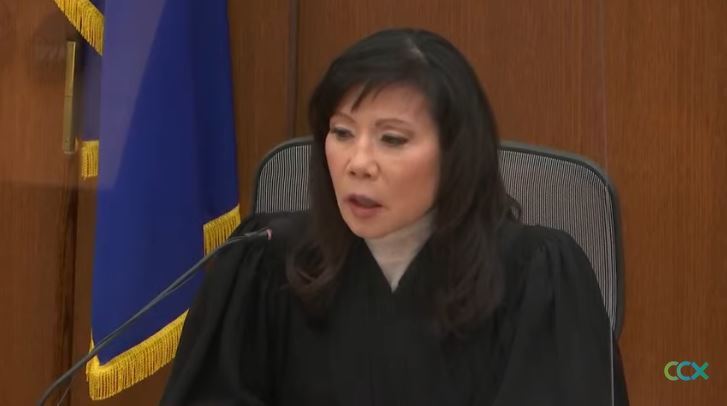
Judge Regina Chu during Friday’s sentencing
Prosecution had argued for upward departure
Daunte Wright was killed April 11 during a traffic stop. Police had tried to arrest Wright for a gross misdemeanor warrant when Wright broke free from an officer trying to handcuff him. He had gotten back into his vehicle and was about to pull away when he was shot and killed. Another officer was on the passenger side also trying to stop Wright from putting the vehicle into drive.
Potter had yelled “Taser” multiple times before the fatal shooting. Instead, the former officer fired her service weapon, when she said she intended to use her Taser. The shooting sparked several days of demonstrations outside the Brooklyn Center police station marked by tear gas and clashes between protesters and law enforcement.
Prosecutors initially argued that aggravating factors warranted a sentence above state guidelines. During trial, they argued that Potter abused her authority as an officer and that her actions caused a greater-than-normal danger to others. Wright’s white Buick had crashed into another vehicle driven by an elderly couple following the fatal shooting. Judge Chu disagreed with that assessment saying the state had not proved that aspect.
Background of April 11 traffic stop
At the April 11 traffic stop, a Brooklyn Center officer said he initially pulled Wright over for having expired license tabs and an air freshener dangling from his rearview mirror. That officer, Anthony Luckey, said he also noticed Wright put on his right blinker in a left turn lane near 63rd and Zane Avenue.
After the traffic stop, officers later learned that Wright had an outstanding warrant for a weapons possession charge. They also learned Wright had a restraining order filed against him by an unknown woman. A different female passenger was in the car with Wright at the time of the attempted arrest. Officers had not yet determined which woman had the protective order.
Wright also had no license and no insurance for the vehicle he was driving. Marijuana was also found in the car.
Former Brooklyn Center police officer Kim Potter will be sentenced after being convicted in December of first and second-degree manslaughter for fatally shooting Daunte Wright during a traffic stop last April. The sentencing hearing begins at 9 a.m. before Hennepin County District Court Judge Regina Chu.
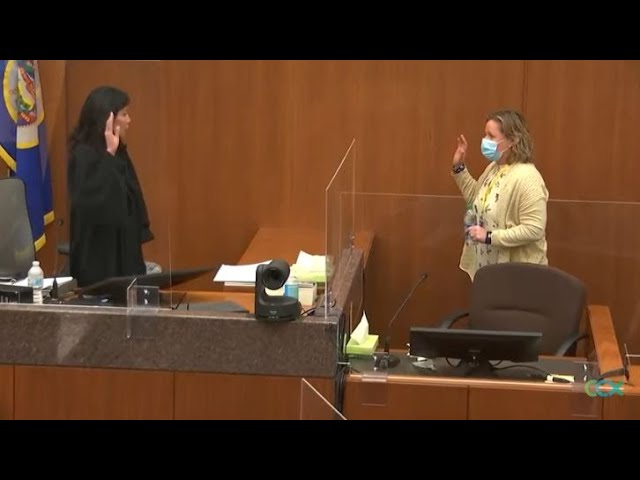
Under Minnesota statutes, Potter will be sentenced on the most serious charge of first-degree manslaughter. As for how Judge Chu will rule, CCX News asked a criminal defense attorney based in Rogers to provide perspective.
“In this particular case, a presumptive sentence is 86 months in prison,” said Matt Holson, a criminal defense attorney from Martin & Wagner Law Firm. “There is a range that the judge can sentence between the low end of the box of 74 [months] and the high end of the box is 103 [months]. For the judge to do something different than that, either to give more time or less time — or as the defense is asking to sentence Kim Potter to probation — the court has to find substantial and compelling reasons to treat this case differently than the average case.”
Kim Potter Found Guilty of Both Manslaughter Charges
A 12-member jury has found former Brooklyn Center police officer Kim Potter guilty of both first- and 2nd-degree manslaughter for the death of Daunte Wright. Jurors reached the verdict midday Thursday. Potter did not express any strong emotions as the verdict was read.
Jurors presented the verdict to Hennepin County District Judge Regina Chu who read it via livestreaming at 1:30 p.m.
The jury began deliberating at about 12:45 p.m. Monday. Deliberations lasted for close to 28 hours. Jurors heard 11 days of testimony and arguments from both sides of the case.
Judge Chu ordered Potter to be held without bail despite arguments against do so by the defense.
“I cannot treat this case any differently than any other case,” Chu said in keeping Potter in custody.
Potter walked into the courtroom holding the hand of her husband, Jeff. As each verdict was read, members of Daunte Wright’s family let out cries each time, according to a pool reporter in the courtroom.
All jurors nodded in unison when Judge Chu asked if this was their “true and unanimous” verdict. One of jurors could be seen crying, according to a pool reporter, as they stood up to leave.
Defense attorney Paul Engh argued against incarceration before sentencing saying “there’s no evidence she would flee.” Prosecutor Matthew Frank stated that Potter now living out of state is an “aggravating” factor in keeping her in custody.
Sentencing will be held Friday, Feb. 18, at 9 a.m.
As a deputy put Potter in handcuffs and walked her out of the courtroom, Potter’s husband yelled out “I love you Kim.” Potter said “I love you” back.
Potter said she mistook her firearm for her Taser. During court testimony, Potter said she never once fired her firearm or deployed her Taser during her 26-year career with the Brooklyn Center Police Department until the Daunte Wright traffic stop on April 11. She did say she drew her Taser at some points, but never deployed it.
Under orders from Hennepin County District Judge Regina Chu, the jurors remained sequestered throughout deliberations until they could reach unanimous verdicts on both counts.
The jurors consisted of six men and six women. Nine are white, two are Asian women and one is a Black woman.

Kim Potter as verdict was read
Jurors Struggled to Reach Consensus
On late Tuesday afternoon, jurors submitted two questions to Hennepin County District Judge Regina Chu. One of the questions involved what steps the jury should take if members cannot reach a consensus on a verdict.
The 12-member jury needed a unanimous verdict to decide guilt or acquittal.
Judge Chu told the jurors, “You should discuss the case with one another and deliberate with a view toward reaching agreement. If you can do so without violating your individual judgment, you should decide the case for yourself, but only after you discussed the case with your fellow jurors and have carefully considered their views.
She continued, “You should not hesitate to re-examine your views and change your opinion if you become convinced they are erroneous. But you should not surrender your honest opinion simply because other jurors disagree or merely to reach a verdict.”
The second question involved jury protocols on removing Potter’s unloaded gun from its box, which is secured with zip ties. Judge Chu said jurors can remove the weapon out of the box with help from a deputy.
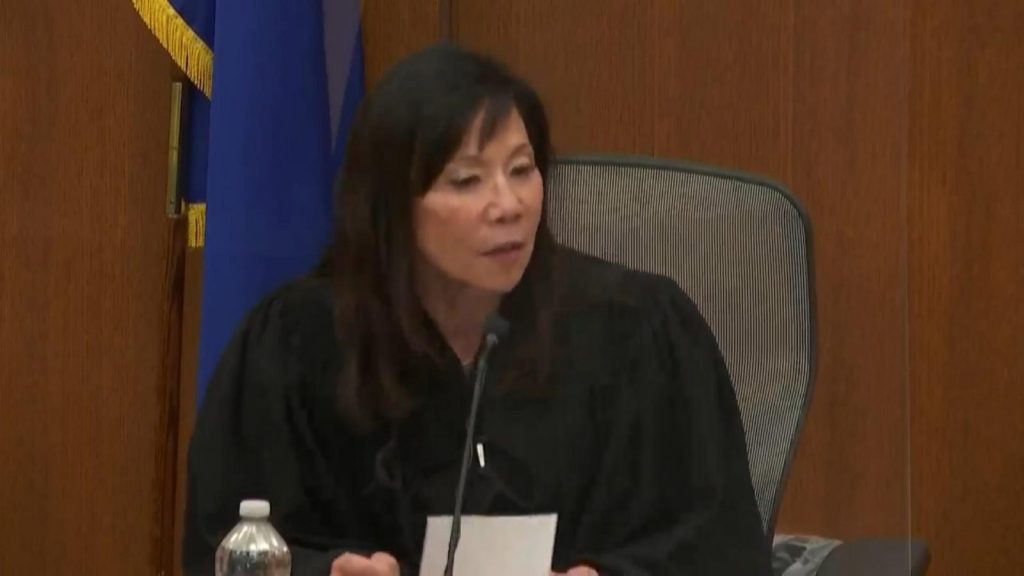
Judge Regina Chu
Closing Arguments Put Jurors to the Test
During closing arguments, the prosecution argued that making a mistake is still a crime and that none of Wright’s criminal background mattered in the case. Prosecutor Erin Eldridge accused Potter of ignoring years of training. She argued that Potter should have known she was using her firearm instead of her Taser.
“This was a colossal screw-up. A blunder of epic proportions,” said Eldridge during closing arguments.
The defense argued that Potter would have been justified in using lethal force whether she intended to use her Taser or not because her police colleague, Sgt. Mychal Johnson, was leaning in on the passenger side trying to stop Wright as Wright fled the scene, potentially putting Johnson in harm’s way.
“There’s two absolute reasons why she’s not guilty. Absolute. She didn’t cause this and she had a right to use deadly force,” argued Potter defense attorney Earl Gray during his closing arguments.
Both sides disagreed on whether Johnson could have been seriously hurt, with the state arguing that Johnson was already backing away when Potter yelled “Taser! Taser! Taser!”
According to court testimony, the state paid $9,000 to have jurors hear from University of South Carolina law professor Seth Stoughton, who provided an opinion that officers could have let Wright flee and arrest him later. Stoughton served as a police officer in Tallahassee, Fla., for five years about 15 years ago.
“They have the temerity to talk about Stoughton, a man who had the power to charge up to $93,000 who doesn’t remember being a police officer when I ask about him about crisis,” argued Gray.
Wright had a bench warrant for illegal gun possession.
Added Gray on the Stoughton opinion, “That’s not protecting the public. That’s not serving the public. They had to stop him.”
Wright also had a restraining order against him filed by undisclosed woman. A female passenger in Wright’s vehicle was not the same woman, a fact officers didn’t know at the time.
Eldridge argued that Wright’s decision to flee doesn’t matter in the case.
“This case is about [Potter’s] rash and reckless conduct,” argued Eldridge. “It’s not about her being a nice person or a good person. Even nice people have to obey the law.”
Also See: Potter’s Supervisor Who Responded to Daunte Wright Traffic Stop Testifies
Brooklyn Center Residents React To Potter Verdict
The Brooklyn Center Police Department has been preparing for the conclusion of the Kim Potter trial for months.
Thursday afternoon, former Brooklyn Center officer Kim Potter was found guilty on first- and second-degree manslaughter charges. Potter fatally shot Daunte Wright last April during a traffic stop.
Brooklyn Center police increased patrols and marked off space for peaceful protests.

Brooklyn Center residents gathered at Daunte Wright memorial after verdict was read.
Some residents gathered at the Daunte Wright memorial site near 63rd Avenue and Kathrene Drive after the verdict. People we spoke with say they believe justice was served.
“I’m satisfied. I’m happy with the verdict because it seems like now we’re starting to get justice, and people are starting to hear and see what’s going on in the world,” said Hajji McReynolds, who lives in Brooklyn Center.
“I’m amazed that she’s finally convicted, and it’s all over with,” said Amanda Thell, from Minneapolis.
“I just wanted to come out and offer my support and condolences to the family. Accident or not, a life was taken, and even though I didn’t know Daunte personally, I just want to come out and honor him,” said Brooklyn Center resident Derek Zupfer.
Local Leaders Respond to Kim Potter Verdicts
Local leaders were quick to respond to the guilty verdicts reached by the jury in the trial of former Brooklyn Center police officer Kim Potter.
Hennepin County Commissioner for District 1, Jeffrey Lunde, which covers the Brooklyn Center area, responded on Twitter. He said in a Tweet, that the “tragedy is never far from my mind” and that “the only way to stop this cycle of institutional violence is by creating systems to keep all residents safe.”
— Jeffrey Joneal Lunde (@JeffreyJLunde) December 23, 2021
The superintendent of Brooklyn Center Schools also released a statement saying that a commitment to students, families and parents remains “our greatest priority.” Dr. Carly Baker went on to say that she knows “that this case and the verdict will have an impact on our community and will continue to have lasting effects as we move forward. Our district leadership will continue to operate with the safety, security, and well-being of our students, staff, families, and community as our top priority. We will remain dedicated to our mission of standing front and center for everyone in our community.” You can read the full statement here.
Rep. Ryan Winkler (DFL-Golden Valley) also responded on Twitter.
Daunte Wright should still be alive. This verdict doesn’t change the fact that we still have a lot of work to do to create a public safety system that protects everyone.
— Ryan Winkler (@_RyanWinkler) December 23, 2021
Rep. Samantha Vang (DFL-Brooklyn Center) said that the “verdict is a move toward accountability so no civilian fears for their life in an encounter with police.”
I am happy to see this trial come to an end and give a moment of closure to Daunte’s family and the community. This may be imperfect justice for Daunte, but this verdict is a move towards accountability so no civilian fears for their life in an encounter with police.
— Samantha Vang (@RepSamanthaVang) December 23, 2021
Watch: Jury Reaches Guilty Verdict in Potter Trial
Kim Potter Trail Recap
Jurors in the Kim Potter trial returned for another day of deliberations on Thursday starting at 8:40 a.m. After no verdicts were reached Wednesday, jurors have deliberated for about 24 hours over three days as they attempt to reach a consensus on two manslaughter charges against the former officer.
Jurors are not scheduled to work Christmas Eve through the weekend. They would return on Monday if no verdict is reached Thursday.
On late Tuesday afternoon, jurors submitted two questions to Hennepin County District Judge Regina Chu. One of the questions involved what steps the jury should take if members cannot reach a consensus on a verdict.
The 12-member jury needs a unanimous verdict to decide guilt or acquittal. Potter is charged with first- and second-degree manslaughter for fatally shooting Daunte Wright during a traffic stop April 11.
Judge Chu told the jurors, “You should discuss the case with one another and deliberate with a view toward reaching agreement. If you can do so without violating your individual judgment, you should decide the case for yourself, but only after you discussed the case with your fellow jurors and have carefully considered their views.
She continued, “You should not hesitate to re-examine your views and change your opinion if you become convinced they are erroneous. But you should not surrender your honest opinion simply because other jurors disagree or merely to reach a verdict.”
The second question involved jury protocols on removing Potter’s unloaded gun from its box, which is secured with zip ties. Judge Chu said jurors can remove the weapon out of the box with help from a deputy.
Both prosecutors and the defense attorneys, as well as Potter, were in attendance as Chu provided answers to the jurors Tuesday.
Closing arguments from both sides were made Monday.
“Members of the jury this case is in your hands,” Hennepin County District Court Judge Regina Chu told the jurors on Monday. “Now it’s time to do your job.”
The state argued Potter was “reckless” and showed “culpable negligence” when using her firearm to fatally shoot Wright. The defense says state statute backs their case.
State: “Even nice people have to obey the law.”
Minnesota Assistant Attorney General Erin Eldridge claims that Daunte Wright posed “no threat to those officers” during closing arguments in the Kim Potter trial. Potter is charged with first- and second-degree manslaughter.
“Daunte Wright’s parents, Katie and Arbuey Wright, will have an empty seat at their table this holiday season because the defendant shot and killed him on April 11 of this year,” argued Eldridge as she pointed her finger at Potter.
Potter, a 26-year police veteran, says she intended to use her Taser instead of her firearm. Eldridge argued the defendant should have known better.
“This case is about the defendant’s rash and reckless conduct,” argued Eldridge. “It’s not about her being a nice person or a good person. Even nice people have to obey the law.”
Eldridge argued that Daunte Wright’s decision to flee doesn’t matter in this case. Nor does it matter that Wright was high on marijuana, according to toxicology results, the state’s case continued. Nor does it matter that Wright had a restraining order filed against him with a female passenger in the car, Eldridge argued.
The prosecutor also said Sgt. Mychal Johnson, the third officer at the passenger of Wright’s vehicle, wouldn’t have been seriously hurt if lethal force hadn’t been used.
“No one was dragged. No one was almost dragged,” Eldridge told the jurors. The defense vehemently disputes those claims.
“Ladies and gentlemen and members of the jury, Sgt. Johnson had the time and the forethought to protect Alayna Albrecht-Payton from what the defendant had just done. She shot a driver and sent an unguided hazard down the road. The defendant didn’t save Sgt. Johnson’s life. If anybody saved Sgt. Johnson’s life, it was Daunte Wright when he took a bullet to the chest,” argued Eldridge.
She continued, “You don’t get to shoot someone when things don’t go according to plan.”
Eldridge later said to the jurors, “This was a colossal screw-up, a blunder of epic proportions.”
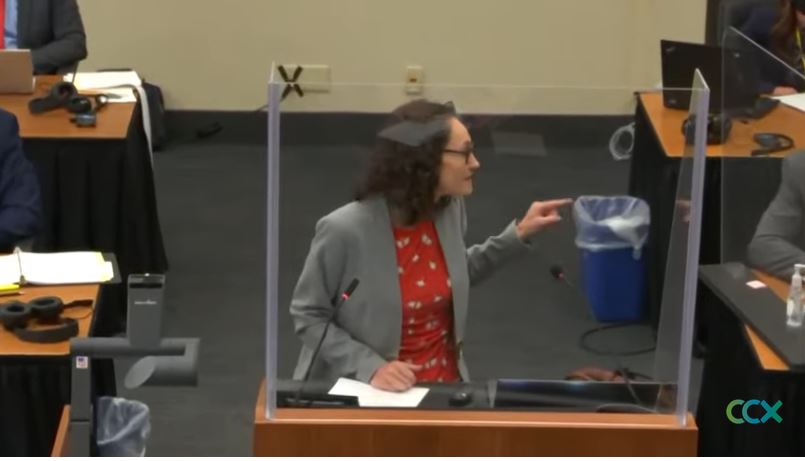
Prosecutor Erin Eldridge points at Potter during closing arguments
Defense: Daunte Wright ‘just didn’t want to go to jail’
Defense attorney Earl Gray gave closing arguments arguing that Daunte Wright’s actions were to blame for the fatal shooting.
“He didn’t want to go to jail. He wasn’t going to listen to these police officers,” argued Gray.
Gray brought up how the state used the video that the defense said was unrealistic of what officer Potter would have seen. The defense also argued that Potter had the right to use deadly force, whether she had intended to or not.
“Officer Potter had the right to use deadly force, even though she didn’t know she was using it, she had a right to. And that’s what the law is.”
Gray later added, “There’s two absolute reasons why she’s not guilty. Absolute. She didn’t cause this and she had a right to use deadly force.”
Gray also provided a reminder to jurors.
“Before you can find her guilty, you must find that each and every element of the charges is proven beyond a reasonable doubt,” he said.
Gray then closed with thanking the jurors.
“The Potter family thanks you for listening to this case.”
He then added, “It’s not a difficult case. They failed in every element. Miserably failed.”
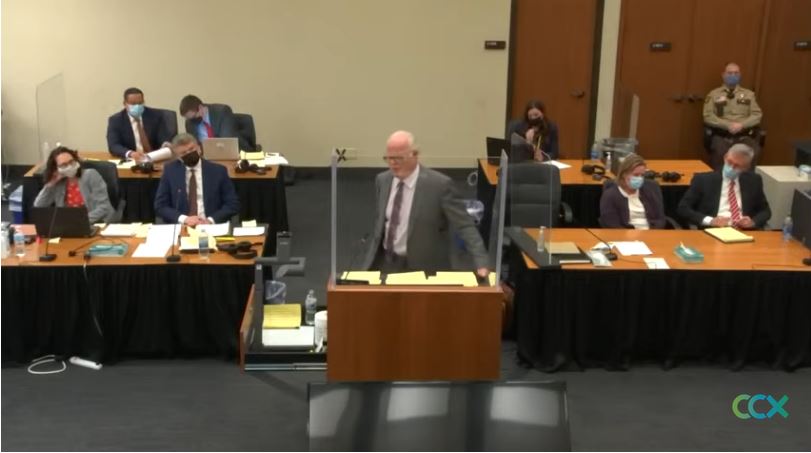
Defense attorney Earl Gray gives closing arguments
The Charges:
First-degree manslaughter, the most serious charge against Potter, requires the state to prove that the former officer “recklessly” handled or used her firearm. The charge also requires the state to prove that death of another person or great bodily harm was “reasonably foreseeable.”
Under the second-degree manslaughter charge, the state must prove “culpable negligence,” meaning a “reasonably prudent person” would recognize a strong probability of injury to others.
For each of the charges, the state is not required to prove any intent on the part of Potter to kill anyone.
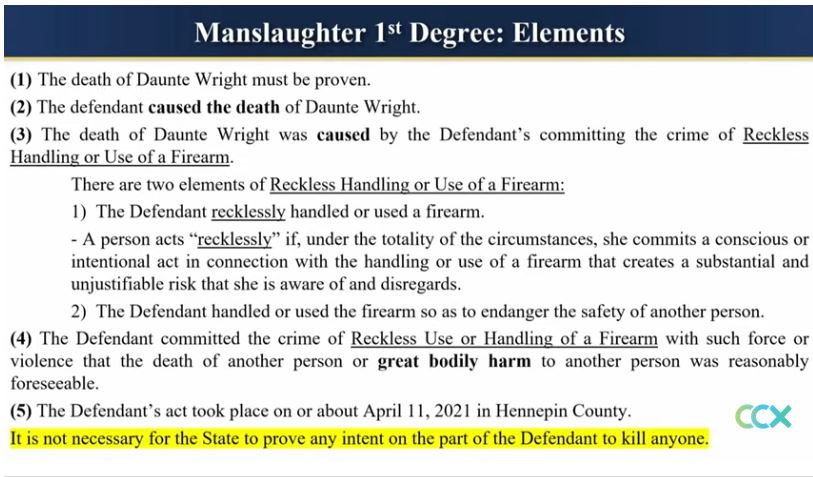
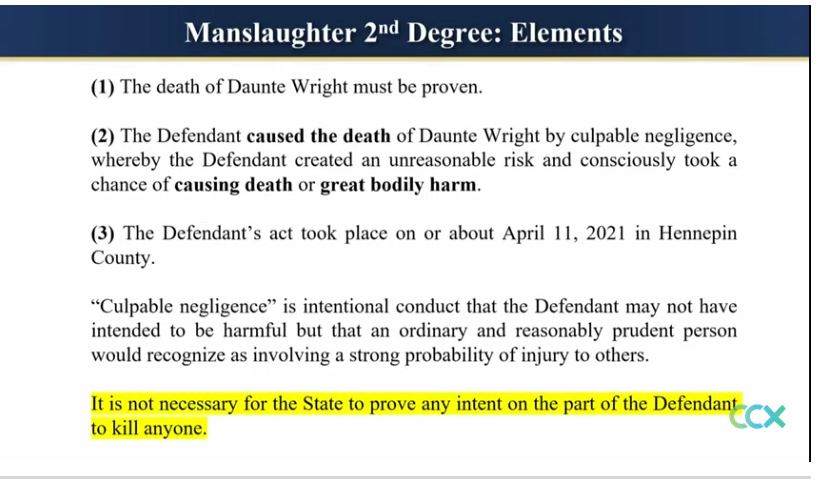
Jurors during deliberations will be able to touch and compare both Potter’s firearm and Taser. They will deliberate until 6 p.m. Monday. After that they will be sequestered for the evening and resume deliberations Tuesday morning.
Potter Takes Stand, ‘I’m So Sorry, I Didn’t Want to Hurt Anybody’
Kim Potter, the Brooklyn Center police center charged with first- and second-degree manslaughter in the fatal shooting of Daunte Wright, took the stand at approximately 10:58 a.m. Friday.
Potter said she was field training officer Anthony Luckey, who wanted to pull over a white Buick. In prior testimony, Luckey said he observed the Buick turn on a right turn signal in a left-turn lane.
When asked if she would pull over the vehicle for a dangling air freshener and expired tabs, she said, “most likely not.” If was Luckey’s call to pull the Buick over because he was field training.
Defense attorney Earl Gray had Potter describe what she saw.
“They’re still struggling and I can see Sgt. Johnson and the driver struggling over the gear shift because I can see Johnson’s hand and I can see his face.”
Sgt. Johnson was the third officer at the scene on the passenger side of Daunte Wright’s vehicle.
“And you knew Johnson from many years before this? Is that right?” asked Gray.
“Yes.”
Gray asked, “And by looking at his face at that point in time, what did you interpret it to mean?”
“He had a look of fear on his face. It’s nothing I’ve seen before,” said Potter visibly shaking.
Asked Gray, “Did you say anything when you saw this?”
“We were struggling and were trying to keep him from driving away. It just went chaotic. And then I remember yelling Taser, Taser, Taser. And then nothing happened. And then he told me I shot him.”
Potter resigned from her job a couple days after the shooting.
Asked why she quit, “There were so many bad things happening, I didn’t want my coworkers and then I didn’t want anything bad to happen to the city,” said Potter, visibly crying.
During further testimony, Potter couldn’t recall the immediate aftermath of the shooting in which Potter could be heard on bodycam footage saying “Oh my God” and “I’m going to prison.”
“They had an ambulance for me and I don’t know why, and I was at the station. I don’t remember a lot of things afterwards,” Potter said.
Gray asked, “Do you remember saying something about prison?”
“No,” Potter said.

Potter described moment of the shooting.
State Presses Potter, Ex-Officer Says ‘I Didn’t Want to Hurt Anybody’
During cross-examination, Minnesota Assistant Attorney General Erin Eldridge kept pressing Potter as the former officer broke down on the stand, accusing Potter of failing to do her duties after she fired the fatal shot.
Eldridge asked, “After you shot Daunte Wright, you didn’t behave like someone who had just saved Sgt. Johnson’s life, did you?
“I was very distraught. I just shot somebody. I’ve never done that,” cried Potter.
Pressed Eldridge, “And you didn’t say anything like, ‘Thank God, I shot that guy and saved your life.’ You didn’t say anything like that, right?”
The question resulted in an objection, but Hennepin District Court Judge Regina Chu overruled.
“You didn’t say that right?”
“No.”
Eldridge continued to press, saying the former officer didn’t render aid or communicate information to other officers.
“You didn’t do any of those things on April 11, did you?”
“No,” said Potter answering quietly, crying.
“You stopped doing your job completely,” said Eldridge. The prosecutor then asked, “You didn’t run down the street and try to save Daunte Wright’s life, did you?”
“No,” said Potter crying.
“You didn’t check on the other car that had been hit, did you?”
“No.”
“That all happened just down the road from you?”
“Yes.”
“You were focused on what you had done because you had just killed somebody.”
“I’m sorry it happened,” said Potter crying. “I’m so sorry.” She then said after further pressing from Eldridge, “I didn’t want to hurt anybody.”
The exchange led to an objection, which was sustained by Judge Chu.
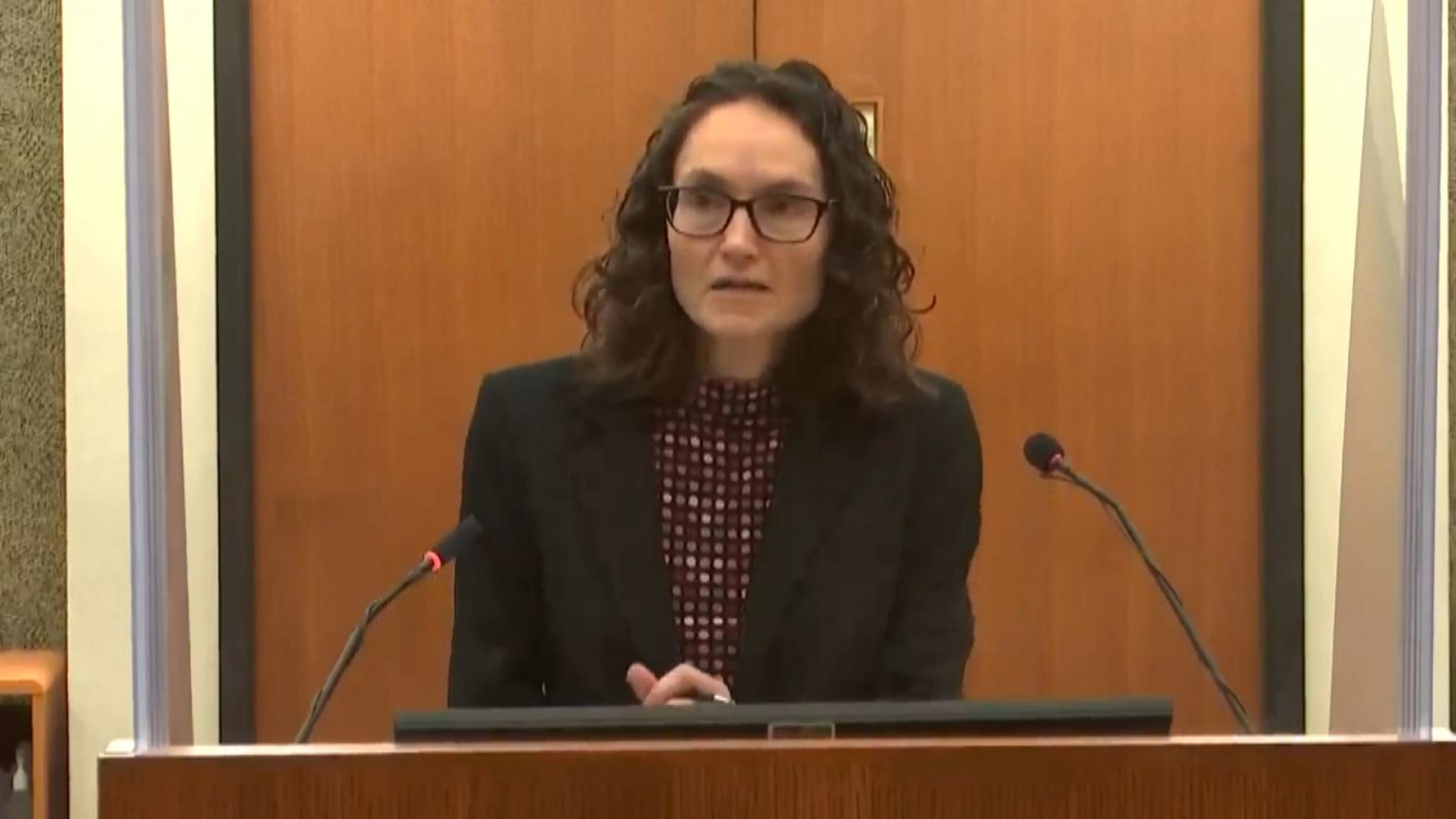
Erin Eldridge, MN assistant attorney general
Kim ‘Enjoyed Work in the Community’
Potter’s husband, Jeff, was in the courtroom as well her elderly mother and a brother. She revealed her father was deceased.
Potter attended school at Totino-Grace in Fridley and interned with the Columbia Heights Police Department. She graduated from St. Mary’s College in Winona with a degree in criminal justice.
When asked why she didn’t seek a promotion in the Brooklyn Center Police Department, the former officer says she didn’t want to take on administrative duties because she “enjoyed work in the community.”
Potter started with the Brooklyn Center Police Department in 1995. Her duties included being a crisis negotiator. She also volunteered for LEMA, carrying the casket of fallen officers who were killed in the line of duty.
She testified she never received any complaints from the public. Potter said she attended all of her training.
The former officer owned a home in Champlin and had to sell to it. She testified that she has since moved out of state.
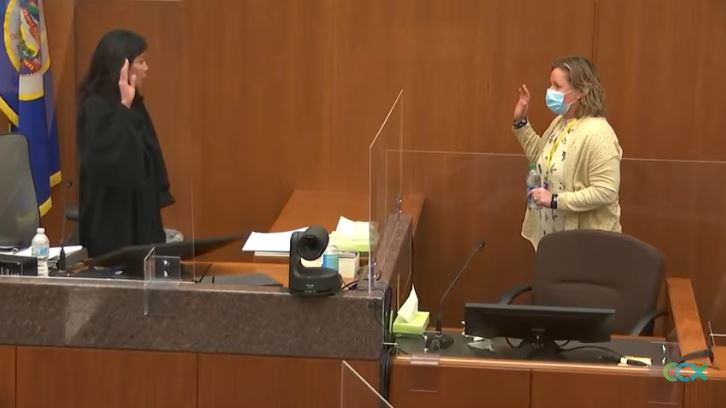
Kim Potter takes oath
Psychologist Testifies on ‘Slip and Capture’ Error
Dr. Laurence Miller, a psychologist from Palm Beach County in Florida, testified on what’s referred to as “slip and capture” or “action error.” It’s a concept used for automatically doing something routine when you intended to do something else.
Miller, 70, gave examples: Driving down the road only to realize the route you took was not your intended route. Or writing a previous year on a check when it’s now a new year. Or typing in an old password instead of the new one.
Miller is a foremost expert on police psychology and is an adjunct professor at Florida Atlantic University in Boca Raton, Fla. He testified that he charges a flat rate to testify in cases. In this case he charged a flat $30,000 fee to the defense.
The psychologist said he reviewed video evidence and met with the defendant, Kim Potter.
Miller provided the “slip and capture” error concept in the defense of Potter, who says she accidentally grabbed her firearm when she meant to use her Taser, despite her 26 years of law enforcement training.
A published author on police psychology with 12 books on related topics, Miller says high-stress incidents can cause “action errors” to occur.
Critics have argued that Miller is wrong to apply psychological principles to incidents where police use lethal force because it’s based on shaky scientific ground. Prosecutor Erin Eldridge during cross-examination tried to characterize it as “junk science.”
“We like to believe we’re always in control of our actions, but most of what we do on daily basis really occurs on an automatic level,” testified Miller. “In fact we couldn’t function if that weren’t the case.”
Miller said if you had to think about everything such getting ready in the morning, “you’d trip over your own mental feet.”
The expert said hyper-focus is caused by “hyper-arousal” where everything else is tuned out but the source of danger.
“In order to do anything well you have to be a certain zone of arousal. In other words, you can’t be too laid back and chill and uninterested because you’re not going to have the motivation to do that skill well,” said Miller.
When that arousal turns to a degree of fear, agitation or panic, Miller said, “then it begins to degrade your performance.”
Miller said “weapon confusion,” said as mistaking a firearm for a Taser, is a subset of “action error.”
He said action errors are more likely to occur when a suspect attempts to flee. That’s when he said tunnel vision kicks in, and other things are tuned out.
“There’s no one thing that causes an action error,” said Miller, but he said it’s the result of cumulative forces.
Miller said these types of confusion errors have happened before in police work. He said it also applies to medicine for doctors who learn brand new procedures in life-saving situations, when a old procedure may be used.
During cross-examination, Eldridge asked “are officers trained to manage stress?”
“They often are and should be yes,” said Miller.
After the witness was allowed to step down from the stand and jurors could take a short break, Hennepin County District Judge Regina Chu held a brief conference with attorneys from both sides. Chu reiterated that no expert can testify that Potter, herself, experienced “slip and capture.”
According to prosecutors, there could be a rebuttal expert on the “slip and capture” issue, which will be dependent on Potter’s testimony. Prosecutors later said no rebuttal expert was needed.
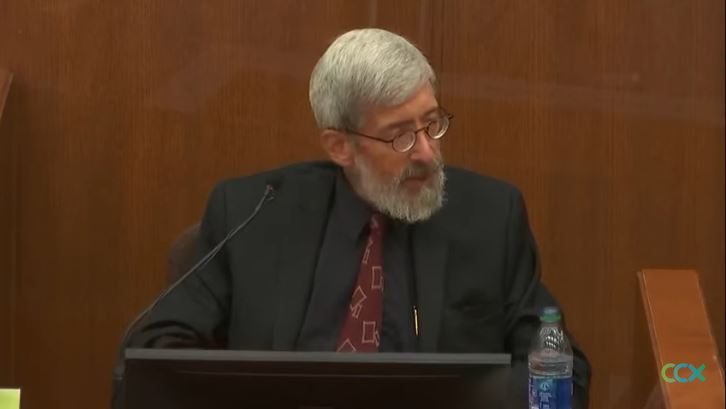
Dr. Laurence Miller has written 12 books on police psychology
Defense Rests Case
The defense rested its case after Potter left the witness stand. Afterward Judge Chu told jurors that all the evidence has been presented and gave them specific instructions about not discussing the case with anybody over the weekend. They were told court will reconvene Monday at 9 a.m.
After the the jurors were excused, Judge Chu met with attorneys from both sides to discuss jury instructions.
Following the meeting, Chu told the attorneys, “I’ve really enjoyed having you. It was a really well-tried case on both sides.”
Also See: Black Men Relay Experiences with Racism as Kim Potter Trial Continues


